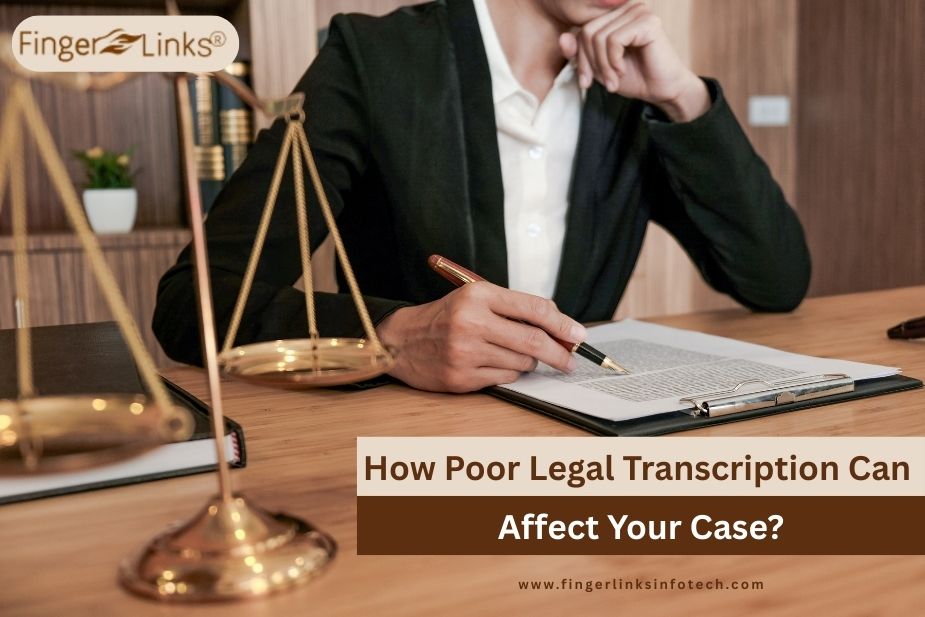How Poor Legal Transcription Can Affect Your Case?
- ⏰ April-04-2025 |
- ✍️ By Admin |
- 🏷️ In Transcription
In the legal world, words carry weight. Every sentence, pause, and phrase can tip the scale toward justice—or injustice. That's why accurate legal transcription services are more than just typing words from audio; it's about preserving the integrity of your case. When legal transcription goes wrong, the consequences can be serious—and sometimes irreversible.
Whether you're a lawyer, paralegal, or someone involved in litigation, understanding how poor transcription can harm your case is essential. This blog will explain how critical and reliable legal transcriptions are and what happens when things go wrong.
The Role of Legal Transcription in Case Building
Legal transcription converts audio recordings—such as courtroom proceedings, depositions, client meetings, and witness interviews—into written documents. These transcripts are often used as references in court, submitted as official evidence, or shared between legal teams. In short, they form a foundational layer of legal strategy.
A single error or omission can cause serious issues. Misquoting a witness or missing key testimony could completely change the perception of a case. And if the transcript is used to file motions, appeal decisions, or prepare cross-examinations, that mistake becomes embedded in every step forward.
Real Risks of Inaccurate Transcription
1. Misrepresentation of Testimonies
Imagine a scenario where a witness says, "I did not see the suspect," but it's transcribed as "I did see the suspect." That one word—not—completely changes the meaning and can compromise someone's freedom or reputation. A misplaced comma or incorrectly noted pause can alter legal interpretation and cause serious misjudgments.
2. Delays and Revisions
Incorrect transcripts lead to confusion, which leads to corrections and resubmissions. This wastes time, delays proceedings, and drains resources. In a legal setting, time is money, and delays can weaken your case strategy or lose your competitive edge.
3. Loss of Credibility
Law firms and legal professionals depend on their records to be accurate. Repeated errors in documentation can damage your professional credibility. Judges, clients, and opposing counsel may question your work's reliability, even if the fault lies with poor transcription.
4. Weakening of Legal Arguments
Legal arguments rely heavily on facts presented in the proper context. If a transcript misquotes a statute, distorts a witness's response, or fails to capture tone or inflection where relevant, it weakens the foundation of your argument. You could end up defending a position that was never made in the first place.
5. Appeal Risks and Rejected Evidence
In appellate courts, written transcripts often form the backbone of appeals. The appeal could be dismissed outright or judged unfairly if the original transcription is flawed. Faulty transcripts also risk being rejected as evidence, severely damaging your client's position.
Why Accurate Legal Transcription Services Matter?
Reliable legal transcription services bring precision, confidentiality, and consistency to your casework. Trained legal transcriptionists understand the terminology, context, and importance of every line they type. They don’t just transcribe—they interpret speech patterns, apply legal formatting standards, and deliver error-free documents on time.
Some of the key benefits of working with a professional transcription provider include:
. Verbatim transcription to capture every word and nuance
. Time-stamped documents for quick referencing in court
. Strict confidentiality protocols to protect client data
. Quality assurance checks to eliminate errors before delivery
. Familiarity with legal language and formatting standards
Your small investment in professional transcription can save you thousands in legal damage control and reputation repair.
Common Causes of Transcription Errors
Knowing the common causes of errors can help you choose better services:
. Untrained transcriptionists unfamiliar with legal language
. Poor audio quality with background noise or multiple speakers
. Strong accents or fast speech that’s hard to capture accurately
. Heavy reliance on AI tools without human proofreading
. Lack of standard formatting or time-stamping
By partnering with trusted legal transcription services, you minimize these risks and ensure that every word recorded in your documents supports your case, not weakens it.
Real-Life Case Impact: How One Error Changed Everything
Consider a case where a single word in a deposition transcript was misunderstood. A witness stated, “I never approved that contract,” but the transcript read, “I did approve that contract.” This transcription mistake wasn’t discovered until mid-trial. The error led to confusion, delayed proceedings, and allowed the opposing counsel to challenge the witness’s credibility.
This situation could have been avoided with professional transcription, highlighting just how high the stakes are regarding accuracy.
Best Practices to Avoid Transcription Pitfalls
To safeguard your legal documents:
. Always review transcripts before submission.
. Choose transcriptionists with legal experience.
. Record audio in a quiet, controlled environment.
. Avoid relying solely on AI-based transcription tools.
. Make use of transcript proofreading and review services.
Being proactive about transcription quality can protect your case and your professional reputation.
The Cost of Cutting Corners
Some legal teams try to save money by using cheaper freelance transcriptionists or automated tools. But low cost often means low quality. The long-term costs of transcription errors can include:
. Case dismissal
. Client dissatisfaction or lawsuits
. Negative reviews or public backlash
. Lost opportunities for appeals
. Permanent damage to your legal reputation
Accurate transcription isn’t a luxury when the stakes are high—it’s a necessity.
Conclusion: Trust the Experts
When your case depends on the accuracy of words, every detail counts. Don't let poor transcription compromise your efforts, reputation, or client outcomes. Quality transcription ensures your documents are legally sound, court-admissible, and professionally formatted.
Fingerlinks Infotech provides expert legal transcription services that deliver accuracy, speed, and confidentiality—so you can focus on winning the case, not fixing transcripts.
FAQs
Q1. What’s the difference between general and legal transcription?
General transcription includes casual audio content like interviews or podcasts. Legal transcription involves specialized content that must meet legal standards and include exact wording, formatting, and confidentiality.
Q2. Are automated transcription tools reliable for legal use?
Not entirely. While they offer speed, they often misinterpret legal terminology or accents. A trained human transcriptionist should always review legal documents.
Q3. How do I choose a reliable legal transcription service?
Look for providers with legal experience, client confidentiality policies, high accuracy rates, and positive reviews from legal professionals.







.png)



.jpg)
